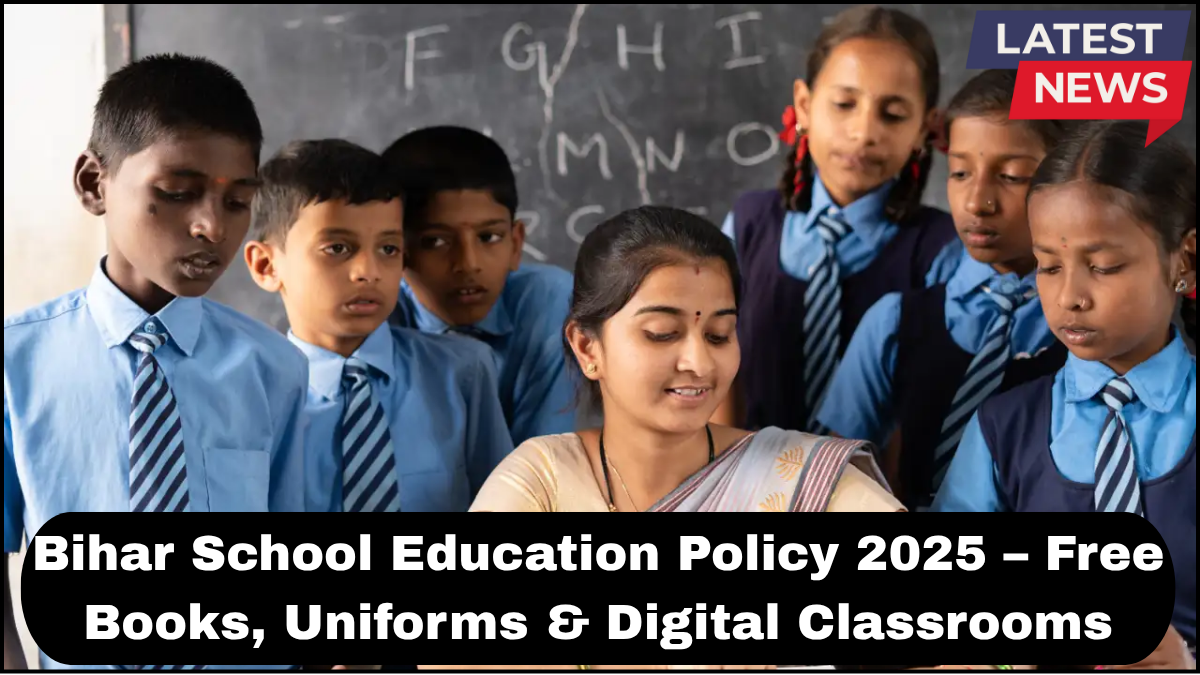The Bihar School Education Policy 2025 marks a transformative step in reshaping the educational landscape of the state. With a firm focus on inclusivity, access, and quality, this policy introduces significant reforms aimed at reducing dropout rates, promoting digital literacy, and supporting underprivileged students. Core elements of the initiative include the free uniform & book scheme, upgraded infrastructure, teacher training, and a broad digital education drive.

Bridging Educational Gaps Through Free Uniforms and Books
One of the most impactful components of the policy is the free uniform & book scheme, designed to ease the financial burden on families and encourage school attendance. By providing free textbooks and two sets of school uniforms annually, the government aims to eliminate basic barriers that often discourage enrollment, particularly in rural and economically backward areas.
This initiative not only promotes equity but also enhances student morale. A standardized uniform fosters a sense of belonging and reduces visible socio-economic differences among students. Meanwhile, the distribution of textbooks ensures that every child, regardless of background, has equal access to learning resources from day one.
Digital Classrooms: Advancing Education Through Technology
Recognizing the growing importance of digital literacy, the Bihar School Education Policy 2025 prioritizes the modernization of classrooms. The state has committed to introducing digital classrooms across government schools, starting with high-density districts and gradually expanding statewide.
These digital setups include smart boards, tablets, and internet-enabled devices, allowing teachers to use multimedia content, interactive simulations, and real-time assessments to enhance engagement. The policy also includes teacher training modules to ensure educators are fully equipped to leverage technology for better learning outcomes.
The long-term goal is to create a tech-enabled generation that can compete globally and thrive in a knowledge-based economy.
Focus on Primary and Secondary Education
A crucial area of emphasis is the strengthening of primary and secondary education. The policy mandates a robust curriculum framework aligned with the National Education Policy (NEP) 2020, incorporating foundational literacy, numeracy, critical thinking, and life skills.
To tackle the quality gap, the policy also proposes:
-
Increased teacher recruitment with merit-based selection
-
Continuous professional development for educators
-
Regular assessments to monitor student progress
-
Localized language instruction for early learners
By focusing on the foundational years, the state intends to build a solid base that ensures long-term academic success.
Inclusive Education and Gender Equity
The Bihar government has also embedded principles of inclusivity and gender equity into the education policy. Special programs have been designed for:
-
Girls and children from minority communities
-
Students with disabilities
-
Children from Scheduled Castes and Scheduled Tribes
For example, the policy includes gender-sensitization training for teachers, separate sanitation facilities for girls, and transportation support for students in remote areas. These initiatives are expected to significantly reduce dropout rates, especially among adolescent girls.
Infrastructure and School Development
Beyond classroom learning, the policy outlines a comprehensive roadmap for infrastructure improvement. This includes:
-
Building additional classrooms and science labs
-
Installing clean drinking water systems and toilets
-
Ensuring consistent electricity and internet access
-
Creating green and safe school environments
These infrastructural upgrades aim to create a learning environment that is physically and mentally conducive to student growth.
Monitoring and Implementation
The Bihar government plans to roll out the policy in phases, with real-time monitoring mechanisms in place. A centralized data dashboard will track school performance, student attendance, teacher training sessions, and digital resource usage.
Additionally, District Education Officers (DEOs) will be given more autonomy to adapt and implement policy measures based on local needs. This decentralized approach is designed to ensure timely execution and measurable impact.
FAQs: Bihar School Education Policy 2025
Q1: What is the Bihar School Education Policy 2025 all about?
A: It’s a comprehensive education reform strategy focused on improving quality, accessibility, and digital integration in Bihar’s school system. Key highlights include free books and uniforms, digital classrooms, better infrastructure, and teacher training.
Q2: Who benefits from the free uniform & book scheme?
A: All students in government schools across Bihar, particularly those from low-income families, benefit from the free uniform & book scheme.
Q3: When will digital classrooms be implemented?
A: The rollout has begun in selected districts and will expand gradually across the state by 2025, prioritizing underserved regions first.
Q4: How does the policy support girls’ education?
A: The policy includes gender-specific measures like separate toilets, transportation assistance, and programs aimed at reducing dropout rates among girls.
Q5: Is there any provision for teacher development?
A: Yes, the policy mandates ongoing professional training and upskilling of teachers to improve classroom effectiveness and adapt to new teaching technologies.
click here to learn more